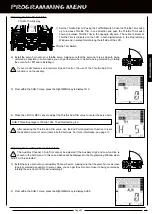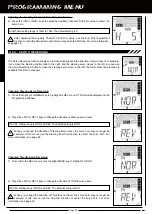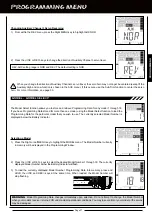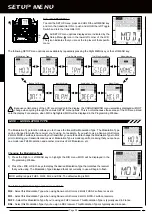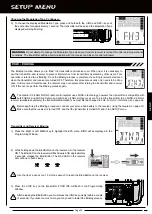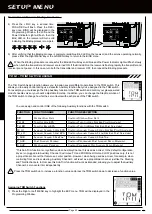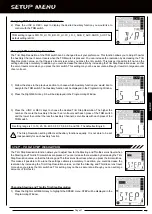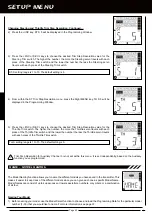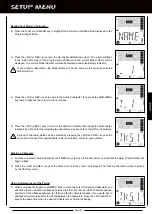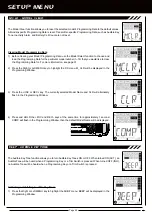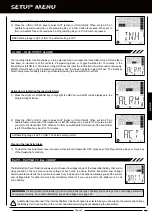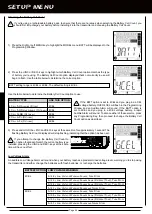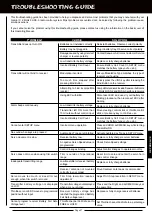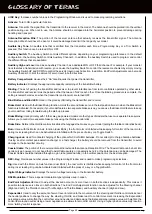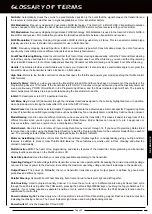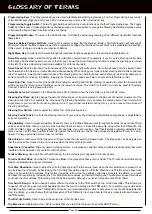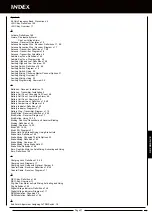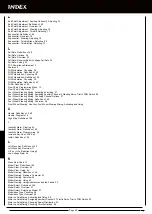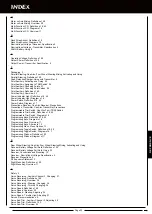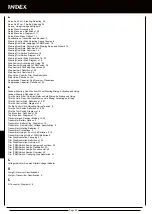
Page 49
gLOSSaRY OF TERMS
Fail Safe:
Automatically moves the servos to a predetermined position in the event that the signal between the transmitter and
the receiver is interrupted, whether due to signal degradation or to low transmitter battery.
FH2 Modulation:
Frequency Hopping 2nd generation FHSS technology. The
Gemini X 2.4GHz FHSS-3
transmitter modulation
can be changed to FH2 to allow the use of Sanwa or Airtronics FHSS-2 2.4GHz surface receivers with your transmitter.
FH3 Modulation:
Frequency Hopping 3rd generation FHSS technology. FH3 Modulation is used in the Gemini X
2.4GHz FHSS-3
transmitter and receiver. FH3 modulation provides the fastest response time between transmitter and receiver.
FH3F Modulation:
Frequency Hopping 3rd generation FHSS technology used only in France. This is a special modulation type
typically used in France. It should not be selected for use in North America.
FHSS:
Frequency Hopping Spread Spectrum. FHSS is a modulation type which transmits data across the entire frequency
spectrum by transmitting data on different channels at an extremely fast interval.
Four Wheel Steering Mixing:
Used to control either the Front or Rear steering independently, or Mix the Front and Rear steering
so that they can be used together. For example, if your Rock Crawler uses Four Wheel Steering, you can use the Programming
Keys to switch between Front or Rear Independent Steering, Parallel Four Wheel Steering, and Tandem Four Wheel Steering.
Handle:
The Handle provides a comfortable way to carry your transmitter. It also provides a comfortable angle to program the
transmitter when the transmitter is laid on its back on a flat surface.
High Side:
Refers to the throttle control stick stroke that opens the throttle and powers your model (pushing the throttle control
stick forward).
Inactivity Alarm:
Warns you when you leave the transmitter turned ON and there has been no movement of the controls or the
Programming Keys for 10 minutes. If the transmitter is left ON for 10 minutes or longer without any input the Inactivity Alarm will
sound continuously, POWR ON will flash in the Programming Window, and the Power Indicator Light will flash. The Inactivity
Alarm helps prevent battery drain by accidentally leaving the transmitter turned ON.
Inhibit:
To deactivate or turn OFF a particular function.
Left Menu Key:
Scrolls left (backward) through the individual functions assigned to the currently highlighted menu. In addition,
when held down while turning the transmitter ON, enters the SETUP menu.
Model Clear:
Used to reset the selected model's Programming Data to the default values. All model-specific Programming Data
is reset. Transmitter-specific Programming Data, such as Audible Key Tone, Inactivity Alarm, and Battery Cell Count are not reset.
Model Naming:
Used to name the different models you have saved in the transmitter. This makes it easier to keep track of the
different models since you can give each one a specific Model Name. Model Names can consist of up to 4 upper-case or
lower-case letters, numbers, or symbols, or a combination of all four.
Model Select:
Used to store and retrieve Programming Data for any model 1 through 18. If you have Programming Data stored
for more than one model, using the Model Select function to load the Programming Data for the particular model that you wish to
use. The currently selected Model Number is displayed below the Battery Indicator.
Motor on Axle Mixing:
Used to control either the Front and Rear throttles together or independently, giving you Dig and Burn
features, in addition to Front or Rear Throttle Hold features. These features are mostly used in Rock Crawling and allow the
utmost in functionality.
Multi-Function LCD:
The heart of the programming and display features of the transmitter. All programming and transmitter
display functions are shown on the Multi-Function LCD.
Neck Strap Anchor:
Used to attach your neck strap (available separately) to the transmitter.
Operating Voltage:
The safe voltage that the transmitter or receiver can operate within. Exceeding the minimum operating voltage
can result in loss of power to the device(s). Exceeding the maximum operating voltage can result in damage to the devices(s).
Output Power:
The power (in Milliwatts) that your transmitter transmits a signal. Output power is defined by government
guidelines and differs by region.
Parallel Steering:
Used with Four Wheel Steering, both front and rear wheels pivot right and left together.
Point Auxiliary:
Used to program Auxiliary Channel 3 to move the servo to up to 6 different points along its travel, then cycle
through those Points using either the TRM switch, pressing the Left and Right MENU keys or pushing the Toggle Switches. For
example, if your model requires a separate 3-position or more switch to operate a feature, the Point Auxiliary function can be
customized to control this.
Power Indicator Light:
Flashes slowly when the transmitter is turned ON and transmitting a signal. Flashes in rapid succession
indicating that Mixing is Active. The Power Indicator Light is also used during the Binding process.
Power Switch:
Turns the transmitter ON and OFF.
REFERENCE
Summary of Contents for Gemini X
Page 1: ...Page 1 ...
Page 55: ...Page 55 NOTES ...

